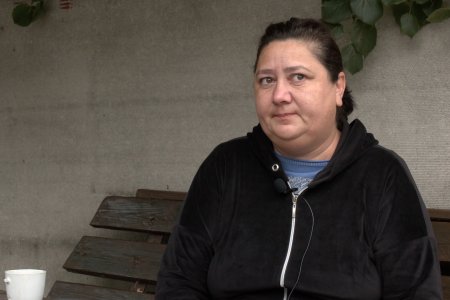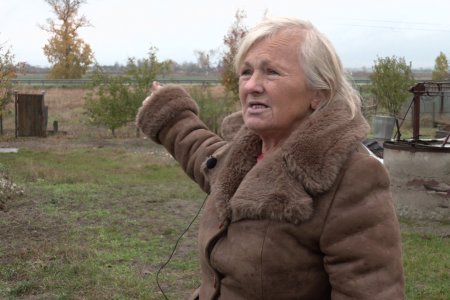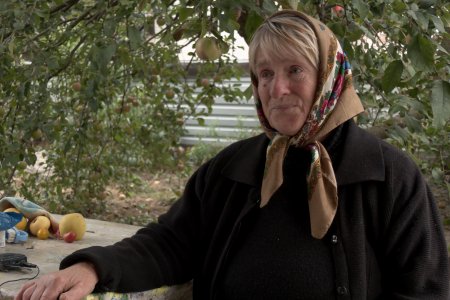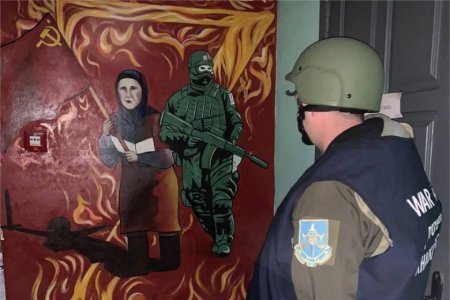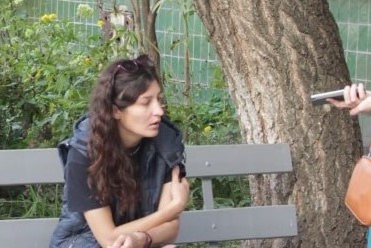
First the Russians occupied the other side of the river. They could not enter our town for almost a month, so they bombed it. For almost a month people hid in basements. The Russians were dropping bombs on us. Civilians died. Believe me, when bombs are falling on your head, a basement is not the right place to hide from them.
We saw everything with our own eyes — bombs being thrown and rockets falling from helicopters. You went out for a walk with your dog and saw the sky filled with helicopters; it was terrifying and frightening.
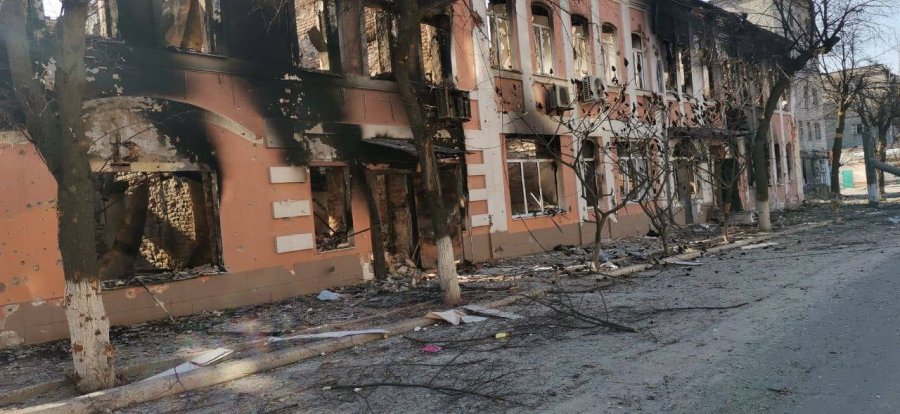
During the first days, when the city centre was destroyed, we were in our flat on the fourth floor. We didn’t go down to the basement. We just couldn’t believe it was real. And then we moved to my mum’s flat on the ground floor. It was not as scary there as it was on the fourth floor.
Occupation
I saw the first Russians who had just crossed the river and entered our part of town. It happened in the district where we went to buy some lard. We were walking along the empty street and they (the Russians) came towards us. They had no flags, no signs, nothing. They were military. But we couldn’t understand if they were ours or not.
They asked me in Russian: “Is it clear in the town?” I replied: “It is clear in the town, but there are a lot of Russian bastards on the other side of the river!” Then I asked them: “What army do you represent?” “The Russian one!” “Well, then I have nothing to say to you...” And I started to cry.
They said to me: “Please calm down! We are here to liberate you!” I said: “From whom?” They answered: “From the fascists!” I said: “Well, then consider me a fascist... So please, shoot yourself and set me free!”
Can you remember the date of this conversation?
It’s hard to say: the days merged into one. We were in the basement all the time. There was no light, no water. We were in the dark all the time; it was hard. We ran out of candles. We had nothing to eat or to drink. We cooked in the yard. There was no wood. Our friend came with a chainsaw and we cut down dry trees and made a fire. We all cooked together — people from two appartment blocks. There was even a queue to see who would be next to boil water.
Did you have enough food?
My friends helped me a lot. They brought pasta, potatoes and vegetables. To tell you the truth, I was very worried about how I was going to feed my dog when the war started. So, I bought everything I could get my hands on: liver, cereals, pasta. Anything I could feed the dog with. I didn’t even think of myself. And later, during the hardest month in the basement, we all ate what the dog ate. We slept together on the floor in our sleeping bags. The dog kept us warm. The water in the flats froze. We went back to the flat when it was eight degrees above zero. It was warmer there than in the basement.
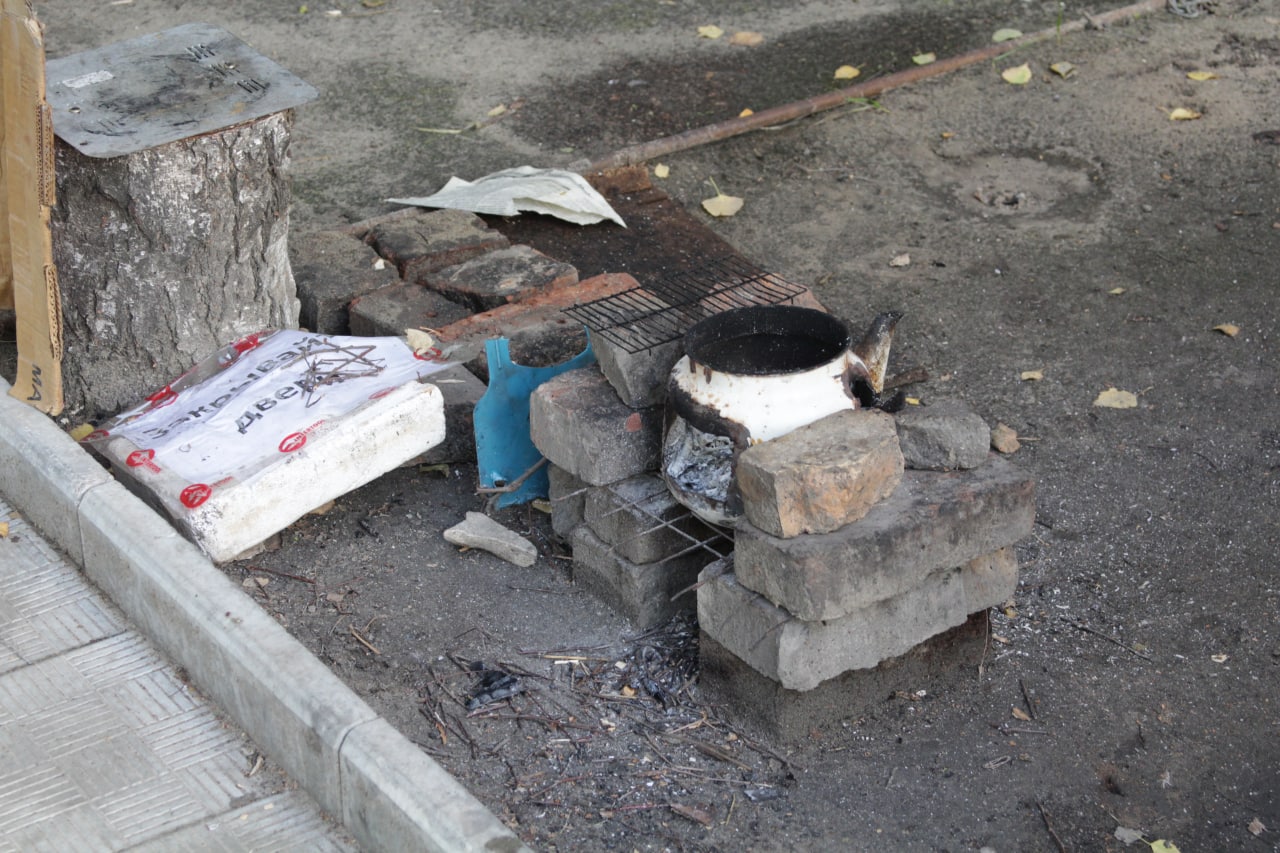
We found a well where we could get water. Later, when the Russians came to the town, they gave some people fuel oil to turn on power generators. There was one man who sold water to the people. The Russians punished that man and made him give out water for free. For a very short time we were able to get water.
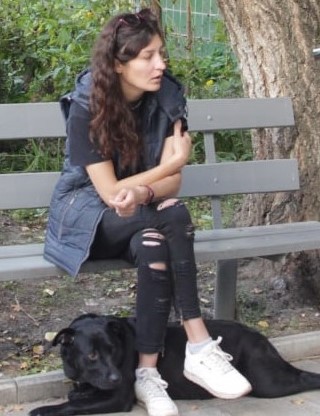
What was the mood like in the town during the occupation?
Morally it was very hard. We saw enemy military equipment all the time. They were always going everywhere, checking everything. They called it “mopping up operation”. They opened all the flats where nobody lived. And everything depended on the human factor. Some Russians kicked in all the doors without listening to anyone. But you could explain to some of them that you could open the doors to the flats when you had keys. They’d just come in and have a look.
Our yard was the only one in the whole neighbourhood that was almost undamaged. There’s only one side of the house with damaged windows. But the rest of the town is bombed and damaged.
I spoke to them in Ukrainian
...One day I heard that someone was trying to break into my friends’ flat. I had the keys to the flat. I ran there with the keys, but they (the Russians) had already smashed the door and damaged the lock. I started shouting: “What are you doing! Get out!” They didn’t even enter the flat and left. Later my neighbours asked me: “Weren’t you afraid to talk to them like that? Are you immortal or what?” Some people even said: “Forget about Ukraine. Here will be Russia!” But I never forgot Ukraine.
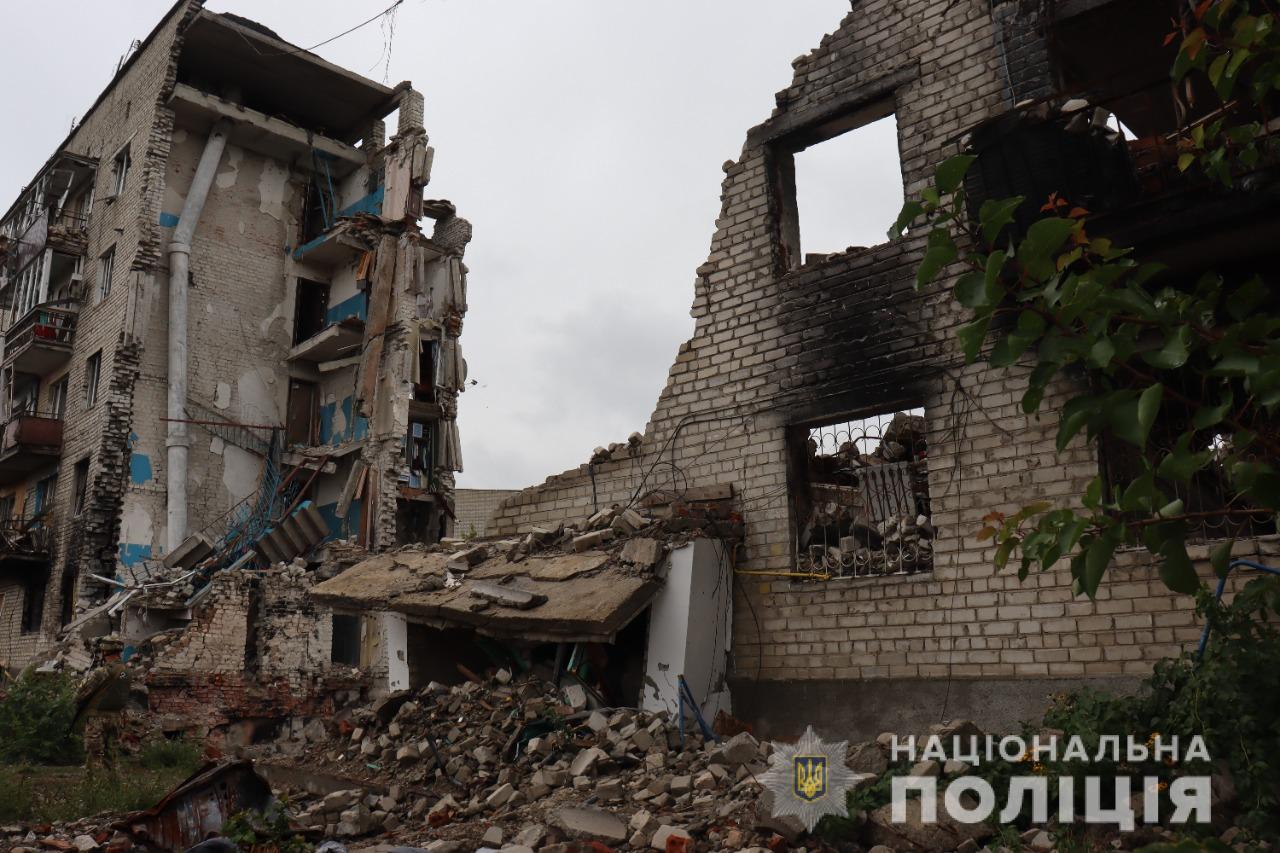
There was a Ukrainian flag hidden in our flat! It was in the cupboard. And we had a little flag in my mum’s kitchen, but we didn’t even hide it. It was in a bunch of flowers and it’s still there. At my friend’s house there’s a trident (Ukrainian national symbol) made out of little lids. You can’t just put it away or hide it like a flag. So they (the Russians) made him cover it with a rag.
Did the Russian military cause any harm to the locals?
I cannot say that they were very harsh on the locals. At checkpoints, when I refused to show my identity card or said to them: “What are you doing here?! Go back to Russia!”, they threatened to shoot me. Different things happened. I was detained three times, but they didn’t hurt me, they just talked to me.
I spoke to them in curse words. They responded in kind. I did what I could, I was very emotional. I called them “zombified” by propaganda, and they responded in kind.
Once they came to conduct a search in your house...
Well, once, when they (the Russians) were doing a census, I didn’t let them take a photo of my Ukrainian identity card. So, they came later with a search. In addition, I spoke to them then in Ukrainian because I saw two rubber bands — yellow and blue — on the uniform of one of the Russian soldiers. And I said: “Guys, it’s so nice to see Ukrainian national colours on Russian uniforms! You’ve made my day! Thank you so much! Would you like to come in for tea?” They refused. And I said: “Come on, I’m not going to poison you. Come in!” They left and two hours later they broke down the gate and surrounded the house. It was like in a movie: everyone in balaclavas, with machine guns. I started shouting at them because they had torn the curtain off the front door. They threatened me with guns. Then we talked. They knew that I was a teacher. They asked me why I didn’t work. I used to teach English. I said: “What are you talking about? There’s a war going on here. And you’re here. When you leave (the town), I will get back to work”. They searched the house but found nothing. They even checked the firewood. They took my car, like they took everyones’ cars. They drew “Z” and “V” on people’s cars, drove them and then left them smashed somewhere.
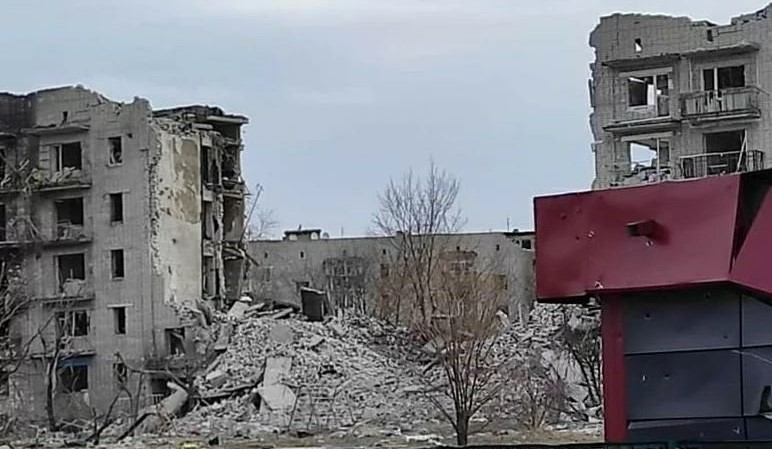
Has anyone you know been arrested?
One of my friends was arrested. His name is Yasha, he served in the Territorial Defence Forces. His flat was burnt down. I saw him beaten and handcuffed, as the Russians put him in the car. I don’t know what has happened to him. It’s been half a year now — and still no news of him (the man is free now — ed.). There was a man from the neighbouring house who had served in the army. They (the Russians) beat him very badly and they the doctors were forbidden to give him first aid. His neighbours knew about the situation. There was a young woman who took care of him. She brought him food and medicine. But there were also those who wanted him dead. It was hard to be surrounded by the Russians and by the neighbours who shook their hands. Some of them listened to Radio “Z”. I said to them: “How can you listen to that? Listen to Ukrainian radio!”
Was it possible to listen to Ukrainian radio during the occupation?
Yes, we could listen to it! As long as we had batteries for our radio, we listened. My godmother listened to it and told us the latest news. We could even watch Ukrainian TV channels when there was electricity supply. Well, we could hardly watch it, but we could listen to it. Now we have no electricity and no batteries. But back then we listened and we believed. There were too many rumours in the town. For example, there was a rumour that we would get new Russian identity cards instead of Ukrainian ones... Well, I haven’t seen any Russian identity cards here.
What were the worst months? Was it the spring of 2022?
Yes, a lot of people died that spring. There were a lot of bombs and shelling. Investigators are now digging up mass graves.
Do you know the places where the detainees were taken?
There were places like that. A friend of mine told me about them, he was there. I didn’t see them myself. He said they (the Russians) kept people in garages somewhere.
Liberation
...When our (Ukrainian) cars first entered the town, we were carrying water home.
My bike and the water fell on the ground: we jumped and shouted “Glory to Ukraine!”
The cars slowed down when they saw people. They signalled to us, they reacted! There was abandoned military equipment near that place. When we went to get water, there was a “Z” sign painted on it. When we went back, there was already a Ukrainian flag on the equipment, “Z” sign had been crossed out, and “ЗСУ” (the Armed Forces of Ukraine) was painted instead. It was awesome! I don’t know how to describe it! I’ve never experienced such feelings in my life.
We appreciate the contribution of our documenters and volunteers Oksana Komarova, Mykola Tsipko, and Denys Moskiienko.
Translation: International Society for Human Rights (German Section)
